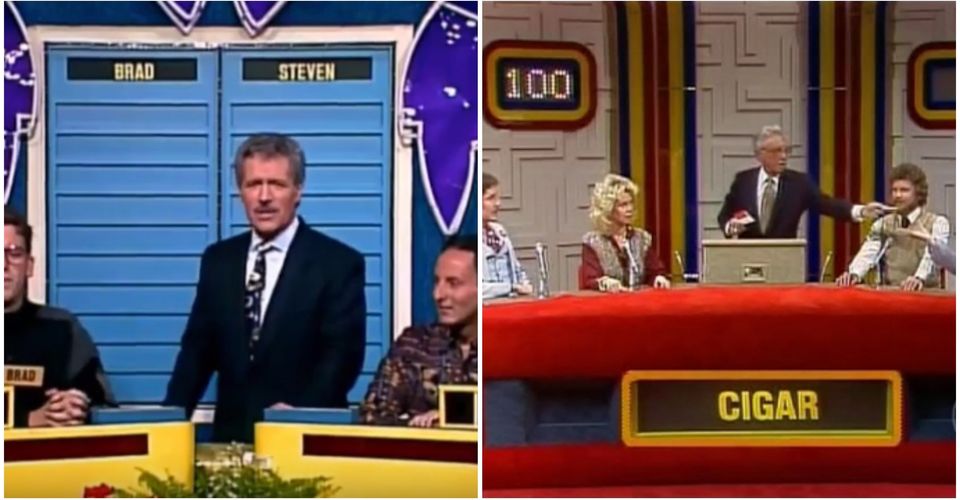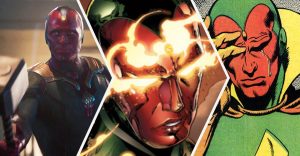10 Classic Game Shows No One Remembers

Even for those who don’t actively watch them, everyone knows Wheel of Fortune, Jeopardy!, and The Price is Right. Thanks to newer game show networks like Buzzr and GSN, the TV-watching public has a chance to revisit many classic game shows that have been long forgotten.
Some of the shows on this list were remade with different titles, adapted into new game shows, or given up on altogether after their runs. Whatever the case, they informed the nature of game shows in the present, while also making the careers of some of the best-loved hosts around today.
10 Classic Concentration (1987 – 1991)

This memory-based matching game is the ultimate expression of late-1980s television. Hosted by Alex Trebek, who was concurrently hosting Jeopardy!, Classic Concentration involves two contestants contending for various prizes by matching prize names on a digital screen.
Underneath the screen lies a puzzle that a contestant must solve in order to win the round. The puzzles are made using pre-computer era graphics and word combinations and their answers are usually famous sayings or euphemisms. The show aired on NBC.
9 Child’s Play (1982 – 1983)

A short-lived game show, Child’s Play has a unique premise: two contestants must identify a word based on videotaped definitions provided by children. The children are aged between five and nine.
Hosted by veteran game show host Bill Cullen, Child’s Play aired on CBS. The show competed with both Wheel of Fortune and Sale of the Century for viewership, and its ratings never matched its competition. It was canceled after just one year of airtime.
8 Password Plus (1979 – 1981)

A revival of the game show Password, Password Plus was hosted by Betty White’s husband, Allen Ludden. Ludden was diagnosed with stomach cancer while serving as host, ultimately leading to his death in 1981. It aired on NBC.
In the show, two teams, each composed of a contestant and a celebrity, trying to figure out a topic based on word clues. In rounds, one team member is given a word and must help their mate figure out the word (or password) based on a one-word clue. The game involves additional, more complex gameplay based upon who wins.
7 Gambit (1972 – 1981)

An adaptation of blackjack for TV audiences, Gambit was a very successful game show in the 1970s. It ran on CBS from 1972 until 1976, and then it was revived by NBC between 1980 and 1981 as Las Vegas Gambit. Both versions were hosted by Wink Martindale.
Like blackjack, the object of Gambit is to get as close to 21 with your card play as possible without going over. Two married couples were placed in teams, and in order to gain access to the cards, they had to successfully answer trivia questions. Merging married couples, gambling, and quiz shows made the show an entertaining venture.
6 What’s My Line? (1950 – 1975)

A panel game show that aired on CBS, four celebrities are tasked with trying to figure out a contestant’s profession. These celebrities are only able to ask “yes” or “no” answer questions.
What’s My Line? was hosted by John Charles Daly, and the guests included politicians, writers, and actors. Although quite structured in terms of gameplay, the show allows for hilarious interactions and exchanges between the panel and contestants. Before a round begins, panelists have a chance to make a wild guess about a contestant’s profession based on how they look.
5 I’ve Got A Secret (1952 – 1967)

Another classic panel game show, I’ve Got a Secret is based on the concept of What’s My Line? Instead of guessing a contestant’s profession, the celebrity panelists are tasked with guessing a secret harbored by the contestant.
Since it’s a game show, the secrets are designed to be funny, jaw-dropping, and sensational. The longer it takes for a panel to guess the secret, the more money the contestant wins. Game shows like this provide great insight into the early days of syndicated television, which were full of explicit product placements and tongue-in-cheek dialogue.
4 Play Your Hunch (1958 – 1963)

Hosted by game show guru Merv Griffin and then by Robert Q. Lewis, Play Your Hunch aired on both CBS and NBC. In the show, two pairs of people – who are either romantically and platonically involved with each other — compete. The purpose of the show is to gauge a team’s power of observation.
The teams must solve a series of problems based on visual queues. Sometimes, it’s a game of chance, while other questions involve quick thinking. The winning team remains on the show until they are defeated.
3 Sale Of The Century (1969 – 1989)

A quintessential 1970s and 1980s game show, Sale of the Century is all about money. Three contestants answer a series of general knowledge questions, earning money for their correct responses. At various points throughout the game, the lead contestant has a chance to exchange some of their winnings for different prizes.
Hosted by Jack Kelly and then Joe Garagiola, the show focuses on the contestants’ interest in either retaining their winnings or using them for prizes. Combining trivia and consumerism, the show highlights both intelligence and spending tendencies.
2 Queen For A Day (1945 – 2004)

The longest-running show on this list, Queen for a Day is also the most problematic. The show’s host during its heyday, Jack Balley, interviews a series of women, who each explains her financial or familial hardships. Then, based on the level of audience applause, the woman who garners the most sympathy is chosen to participate.
The winner is draped in regal attire and granted a series of prizes from sponsors. The other interviewed women also win smaller prizes. By focusing on the woes and troubles afflicting each woman in the show, Queen for a Day became a hit. It predicted the slew of reality television shows about people in dire circumstances that would flood airwaves in the 2000s and 2010s.
1 Tic-Tac-Dough (1965 – 1990)

Based on the paper game tic-tac-toe, Tic-Tac-Dough brings together trivia and strategy in order to make a compelling game show. The show ran on various networks and with various iterations for 25 years.
Contestants are shown a large screen with nine squares, each one representing a potential space to play an X or O. If they answer a question correctly, they can play their respective symbols. As they progress, contestants win money and prizes, all culminating in winning the overarching game of tic-tac-toe. The show had a rotating cast of well-known hosts, including Wink Martindale.
About The Author

















